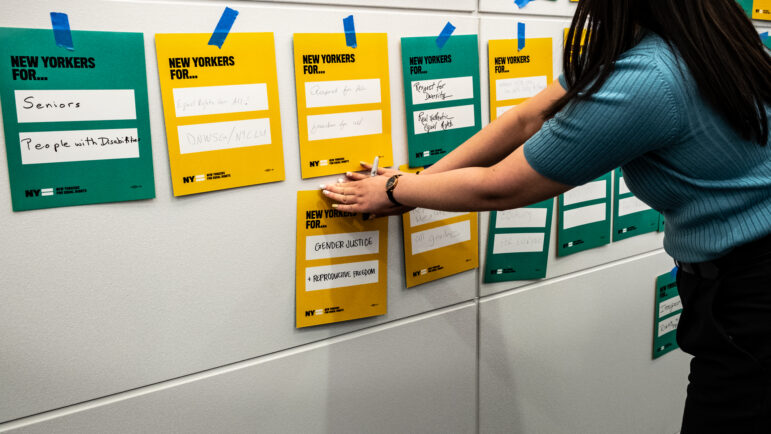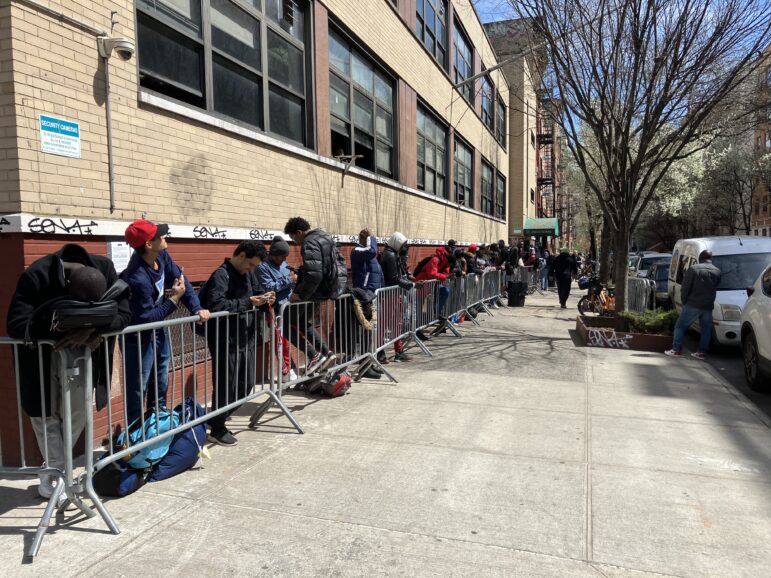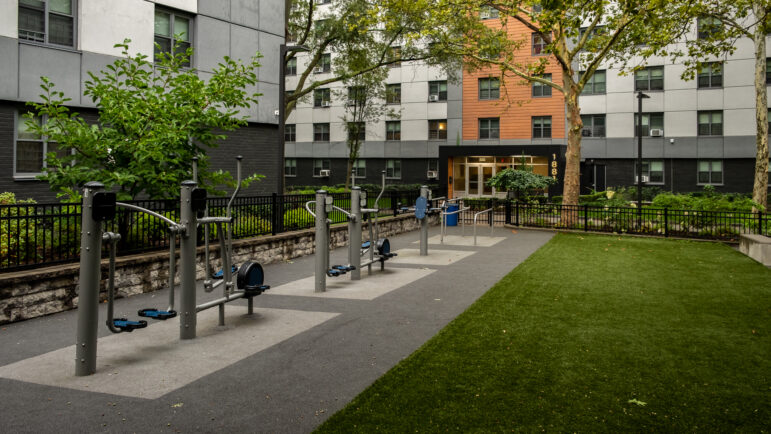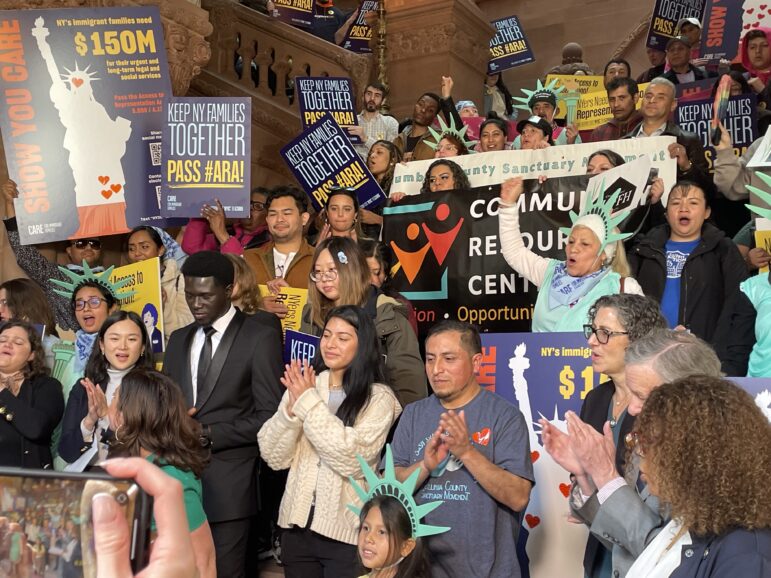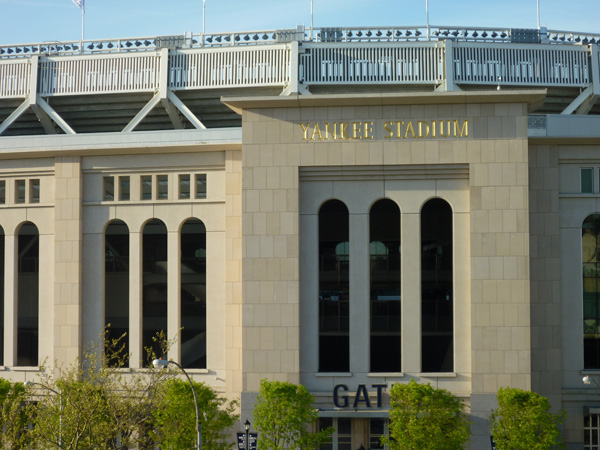
Photo by: Jarrett Murphy
Yankee Stadium is one of several recent development deals where the delivery of “community benefits” has been in dispute.
City comptroller John Liu in February blasted what he said was “a string of broken promises to communities and questionable involvement by some government officials” in development deals from “Atlantic Yards to Yankee Stadium to the Columbia University expansion.” Liu announced a task force to “establish standards…that ensure benefits for the public when private developers receive benefits from the public.”
That task force is now meeting. But its meetings are closed to the public.
Why? Liu’s spokesperson Scott Sieber says that public benefit agreements are a “sensitive issue” and “The comptroller’s office feels it’s important that the Task force members are able to have candid conversations.” While the Task force will be meeting monthly, they aren’t planning to hold any public hearings, according to Sieber.
But whether the task force operates behind closed doors or in full view, some question what the 35-member body can actually achieve. Though the Comptroller serves as a board member of the New York City Industrial Development Agency and the Capital Resource Corporation, which review developers’ requests for public subsidies, altering the city’s land use practices is a tall order.
Liu has pledged to work with the mayor and the Council “to implement a new approach” to public benefit agreements. Yet one Council member requesting anonymity is skeptical that Liu or the Council has the authority to set standards for the agreements or alter the public approval process. The only means of implementing changes, the official asserted, is through revision of the city’s charter or administrative code. But the mayor, who has commissioned a charter revision commission, would be unlikely to support a move that weakens his power over land use.
Despite the qualms about Liu’s approach, many agree that community benefit agreements bear examination.
A community benefit agreement is a contract between a developer and a community coalition that sets forth the benefits the developer agrees to provide the community in exchange for their support of the project. Community benefit agreements address issues like affordable housing, quality jobs, local hiring and neighborhood improvements.
Proponents of community benefit agreements argue that they be can effective in ensuring that developments that receive tax exemptions, low-interest loans, preferential utilities rates and other public subsidies also provide tangible benefits to communities.
Critics of community benefit agreements say the deals are easily co-opted by a few special interests that exclude key stakeholders in the community, preventing the wider population from really benefiting. Critics also argue that too often the agreements can be broken by developers with little consequence.
“I’ve come to believe they should be used only very, very sparingly, and many benefits that are negotiated should really be part of public policy,” says Ronald Shiffman, co-founder of the Pratt Center for Community Development. He helped form the West Harlem Local Development Corporation, which signed a community benefit agreement with Columbia University. Shiffman contends that “Instead of determining the best means and methods of planning and developing the area, zoning and planning were for sale. Columbia used its resources and lobbyists to influence the political and professional establishment.”
Columbia spokesperson Victoria Benitez contends, however, that the university has “worked diligently with the West Harlem Local Development Corporation and its broadly representative board to develop a robust community benefits agreement that all stakeholders anticipate will result in a significant, long-term investment in a wide array of local health, education, social and economic needs as determined by members of the community themselves.”
Tom Angotti, a member of Liu’s Task force and the Director of the Center for Community Planning and Development at Hunter College, believes that strengthening the city’s Uniform Land Use Review Procedure—the public approval process for land use and zoning changes—is an alternative to relying on community benefits agreements. Angotti argues that community boards also need more funding, diversity, and power in local development decisions—an issue at the heart of much testimony to the charter revision commission.
“At present time, there’s a strong mayoral-dominated process and system,” says Angotti. As an alternative to community benefit agreements, Angotti supports development and zoning that arise from community planning through the 197A process, a section of the city charter that authorizes community boards to sponsor land use plans for their district.
Long-time tenant rights and housing advocate Tom DeMott served on the West Harlem Local Development Corporation during its negotiations with Columbia University over its expansion plan. DeMott says he and others resigned from the Local Development Corporation after being excluded from closed-door negotiations with Columbia.
“Basically, they had us on there as window dressing,” claims Demott.
He argues that the Local Development Corporation lost the support of the West Harlem community over the issue of Columbia’s use of eminent domain to seize private land for its campus. Community Board 9 voted against the plan that included land seizures, but it was supported by the Local Development Corporation. Patricia Jones, president of the West Harlem Local Development Corporation and current chair of Community Board 9, couldn’t be reached for comment.
(In December, Columbia’s expansion plan was dealt a serious blow when an appeals court rejected its use of eminent domain. The court ruled that its claim that the neighborhood was “blighted” and “underused” was “bereft of facts”, and thus could not be used to justify eminent domain.)
If the city does revamp the way community benefits are implemented, it will have to wrestle with whether to impose a single set of standards to all projects or retain some mechanism for dealing with each project’s unique characteristics.
John Goldstein from the Partnership for Working Families, a national coalition that supports community benefit agreements, says that successful community benefit agreements have prompted the implementation of permanent standards for subsidized developments in cities around the country.
While Goldstein backs such standards, he contends “every development impacts a community in particular way” and “the government can’t guess what the community benefits for a particular development might be.” Hence, he argues, community benefit agreements should be a component of community development even when standards exist.
“Whatever solutions come up,” says Tom DeMott about the comptroller and task force efforts, “they have to understand that there’s a war going on over neighborhoods. One side, the mayor and developers, have all the power and that has to be turned around.”



